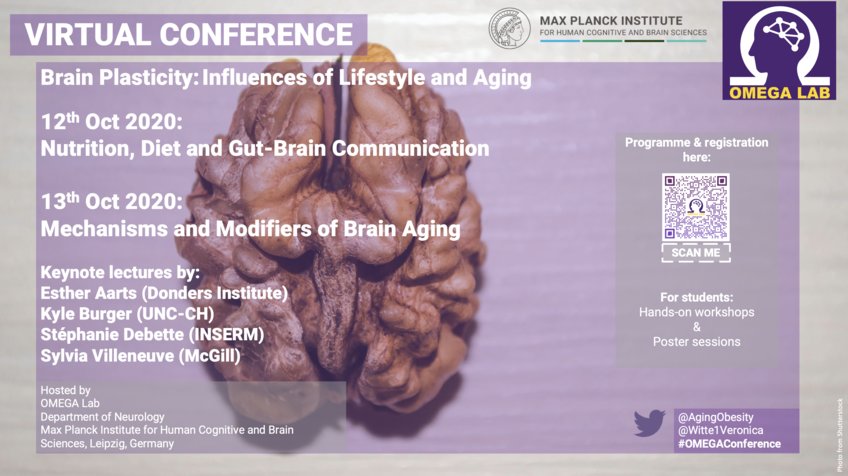
Programme
| Time (CET) |
Monday, 12th October | Tuesday, 13th October | |
| Nutrition, Diet and Gut-Brain Communication | Mechanisms and Modifiers of Brain Aging | ||
| 10.00 -12.00 am | Workshop "Preregistration for neuroimaging" | ||
| 15.00 - 15.45 pm |
Keynote 1: Esther Aarts "Nutrition, aging, and the gut-brain axis: the past, the present and the future" |
Keynote 3: Stéphanie Debette "Genetic determinants of vascular brain aging" |
|
| 15.45 - 16.30 pm |
Keynote 2: Kyle Burger |
Keynote 4: Sylvia Villeneuve "Risk factors for Alzheimer’s pathology" |
|
|
16.30 - 18.00 pm |
Presentation Sessions "Nutrition, Diet and Obesity" Elisa Becker, Evelyn Medawar, Alon Kaplan |
Presentation Sessions "Lifestyle and Aging" Maria Blöchl, Rachana Tank, Filip Morys, Edmarie Guzmán-Vélez, Marta Garo Pascal |
All times are Central European Time (Berlin, Paris, Rome). Starting time in London: -1h, Montréal: -6h, Moskow: +2h, Singapur: + 7h, Sydney: +9h)
Keynote Speakers
Esther Aarts is the head of the Food and Cognition Group at the Donders Institute where she focuses on obesity, nutrition and decision making. In her current projects, she investigates the links between neuroinflammation and decision making in obesity, and the impact of a multi-domain lifestyle intervention on the gut-brain axis in elderly adults.
Kyle Burger is PI of the Neuropsychology of Ingestive Behavior Laboratory at the University of North Carolina. In his research, he focuses on the neural and behavioral underpinnings of habit formation and decision-making processes associated with food choice and eating habits as well as the neurobehavioral consequences of those behaviors, such as weight gain.
Stéphanie Debette is Professor of epidemiology at Bordeaux University, where she directs the VINTAGE team. Her research focus is on the genomics of stroke as well as cardiovascular risk factors and their link to cerebral small vessel disease.
Sylvia Villeneuve is an Assistant Professor at McGill University since 2015 and heads the research group "Multimodal imaging of the aging brain". She investigates brain changes associated with age and neurodegeneratives diseases and how risk and protective factors (e.g. nutrition and vascular diseases) can modify the link between these markers.
Presentation Sessions
During the presentation sessions, early-career researchers have the opportunity to present their projects and results in the form of short presentations (presentation or poster, 6 slides maximum, 8 min. presentation) to their fellow scientists. The presentation is followed by a 7 minute discussion. With this format, we aim to create an encouraging and personal atmosphere in which fruitful exchange and discussions can happen in a virtual form.
On Day 1, we will have the following presentations:
16.30 - 16.45 PM: Elisa Becker (University of Exeter): Meat disgust is negatively associated with meat intake – evidence from a cross-sectional and a longitudinal study
16.45 - 17.00 PM: Evelyn Medawar (MPI CBS Leipzig): Gut microbiota link dietary fiber intake and short-chain fatty acid metabolism with eating behaviour
17.00 - 17.15 PM: Alon Kaplan (Ben-Gurion University of the Negev): The effect of lifestyle intervention on brain atrophy - preliminary insights from the DIRECT-PLUS trial
17.15 - 17.30 PM: Closing of the day
On Day 2, we will have the following presentations:
16.30 - 16.45 PM: Maria Blöchl (University of Leipzig): The age-dependent association between vascular risk factors and trajectories of depressed mood
16.45 - 17.00 PM: Rachana Tank (University of Glasgow): tba
17.00 - 17.15 PM: Filip Morys (McGill University): Obesity impairs cognitive function via metabolic syndrome and cerebrovascular disease: an SEM analysis in 15,000 adults from the UK Biobank
17.15 - 17.30 PM: Edmarie Guzmán-Vélez (MGH/Harvard University): Aerobic fitness as a modifier of neurodegeneration and cognitive decline in autosomal-dominant Alzheimer’s disease
17.30 - 17.45 PM: Marta Garo Pascal (Centre for Biomedical Technology, Universidad Politécnica de Madrid): Lifestyle and Brain Structural Determinants of Superagers
17.45 - 18.00 PM: Closing of the conference
Closing of the conference
Workshop "Preregistration for neuroimaging"
Preregistration of research studies is becoming more and more popular. When you preregister a study, you specify the hypotheses and analysis plan of your study before performing the actual analysis of your data. This allows you to get feedback on your design before collecting the data. It also prevents your from post-hoc modifications of your hypothesis and thereby increases the credibility of your research. Yet, relatively few neuroimaging studies in the field of dietary intervention, lifestyle and ageing have been preregistered. In this workshop, we would like to first introduce the background and basics of preregistration to early-career researchers (master and PhD candidates) in the field. Then, we would like to go through some Do’s and Don’ts and share examples from our own experiences with the benefits and pitfalls of preregistration. Please tick the appropriate box in the registration form to register for this workshop.